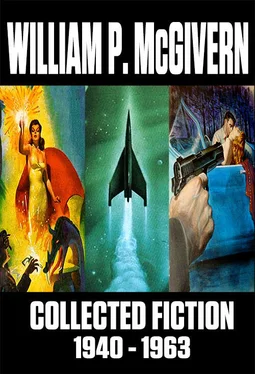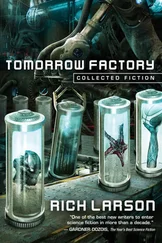Уильям Макгиверн - Collected Fiction - 1940-1963
Здесь есть возможность читать онлайн «Уильям Макгиверн - Collected Fiction - 1940-1963» весь текст электронной книги совершенно бесплатно (целиком полную версию без сокращений). В некоторых случаях можно слушать аудио, скачать через торрент в формате fb2 и присутствует краткое содержание. Год выпуска: 2014, Издательство: Jerry eBooks, Жанр: Ужасы и Мистика, Фантастика и фэнтези, Детектив, Прочие приключения, на английском языке. Описание произведения, (предисловие) а так же отзывы посетителей доступны на портале библиотеки ЛибКат.
- Название:Collected Fiction: 1940-1963
- Автор:
- Издательство:Jerry eBooks
- Жанр:
- Год:2014
- ISBN:нет данных
- Рейтинг книги:3 / 5. Голосов: 1
-
Избранное:Добавить в избранное
- Отзывы:
-
Ваша оценка:
- 60
- 1
- 2
- 3
- 4
- 5
Collected Fiction: 1940-1963: краткое содержание, описание и аннотация
Предлагаем к чтению аннотацию, описание, краткое содержание или предисловие (зависит от того, что написал сам автор книги «Collected Fiction: 1940-1963»). Если вы не нашли необходимую информацию о книге — напишите в комментариях, мы постараемся отыскать её.
Collected Fiction: 1940-1963 — читать онлайн бесплатно полную книгу (весь текст) целиком
Ниже представлен текст книги, разбитый по страницам. Система сохранения места последней прочитанной страницы, позволяет с удобством читать онлайн бесплатно книгу «Collected Fiction: 1940-1963», без необходимости каждый раз заново искать на чём Вы остановились. Поставьте закладку, и сможете в любой момент перейти на страницу, на которой закончили чтение.
Интервал:
Закладка:
“The Superintendent’s coming out,” he said as they sat up, blinking and yawning. “Yeah, that’s right, the Superintendent. And the Mayor’s with him. Better splash some water on your faces.”
The delegation from City Hall arrived within ten minutes. It was a formidable group: Mayor Jeremy Morrison was in the lead, plump, nervous, and harried, and following him was Dick Gibbons, Superintendent of Police, and three men whom Ryan didn’t recognize. One of the strangers, a tall, quietly dressed man with heavy dark eyebrows and a lean sensitive face, was vaguely familiar to Ryan. He had seen the man somewhere before, of that much he was sure; but he couldn’t connect a name of identity to those well-bred, distinguished features.
Morrison did the talking. “Ryan, we have a report that a thin gray-haired man was brought in here about half an hour ago. Is that correct?”
“Yeah, that’s right,” Ryan said. He sensed a sudden excitement in the group; the tall man with the sensitive face let out his breath slowly. What the hell was going on, Ryan wondered. Why this stir over a nameless little drunk?
“Where is he?” Morrison said.
“Downstairs in the cell block,” Ryan said. “They just carried him down there.”
“ ‘Carried’?” The tall man spoke for the first time in a voice that was low but authoritative. “Was he injured?”
“No, he was okay.” Ryan said. “He — well, he gave me some trouble and I had to handle him a bit.”
Something changed in the tall man’s face, and Ryan felt a touch of color come up into his cheeks. The tall man was staring at him as if he were a particularly repellent form of vermin.
“You had to handle him a bit, eh?” the tall man repeated.
“He wouldn’t talk,” Ryan said. “I asked him who he was, that’s all, and he wouldn’t talk.” He felt anger surging through him now. They were all looking at him as if he were some kind of monster. “How the hell am I supposed to do this job, anyway? The only way to handle these bums is to—”
The tall man made a sharp silencing gesture with his hand. “I’m not interested in your philosophy of police work,” he said, in an icy voice. “It would fit perfectly with gas chambers and racks, I’m quite sure.”
Ryan took an involuntary step forward. “Now just a minute,” he said.
Gibbons, Superintendent of Police, said, “Shut up, and stay shut up, Ryan. That’s an order.”
“Let’s go down to the cell block,” the tall man said.
Ryan fought back the words that were pounding for release in his mind. The habit of obedience was strong in him, almost an instinctive reflex of his will. He was capable of swinging at the tall man, although he knew he was someone of importance, but the command of Gibbons, his chief, stopped him dead in his tracks.
The group filed out of the Detective Division, and went downstairs to the first floor of the station. Ryan followed them, his jaw set angrily. They went through to the roll-call room, and the House Sergeant lumbered out of his office and bellowed for the turnkey. There was no answer. “Must be in the cell-block,” the sergeant muttered. “I’ll take you back.”
He opened the door leading to the cell-block.
Ryan heard Gibbons curse.
He looked over his shoulder and saw the turnkey lying on the floor, and the door of a cell standing open. The cell was empty.
There was a furious but despairing bit of activity after that, in which it was ascertained that the slender gray-haired little man had apparently vanished into thin air. The turnkey was revived, and told a vague, bewildered story.
“We brought him in here and dumped him on the cot,” he said, shaking his head slowly and staring anxiously at his circle of questioners. “I came back a while later and he was standing up, right at the door. He beckoned to me, and I walked over to him, thinking, you know, he wanted a drink or something. When I got up close to him—” The turnkey paused, frowning, and rubbed his gray head. “Well, I don’t know just what happened. He reached out and touched me on the side of the face — I mean, he hit me on the face. He must have hit me: sure. That’s all I remember.”
“Well, for God’s sake, did he just walk out then?” Gibbons demanded of no one in particular.
The House Sergeant rubbed his damp forehead. “He could have, I guess. I mean, once he got out of the cell he could walk into the roll room and go out the side door.”
“He can’t be far,” Ryan said. “Let’s move. We can pick him up in ten minutes.”
The tall man studied him carefully, thoughtfully. “This started with you,” he said, in his low voice. “You had the opportunity to—” He paused and shrugged, a gesture of weariness and despair. “However, you chose to exercise your sadistic needs on him, and drive him away from here.”
Ryan said, “I tell you we can get him in ten minutes. Just who the hell is he, anyway?”
The tall man glanced at the Mayor, ignoring Ryan. “I certainly hope this specimen isn’t typical of the men on this city’s police force.”
Mayor Morrison, an expert politician, reacted almost instinctively to the prod in the tall man’s voice. “You can believe me he isn’t,” he said, in the ringing tones he would use to a Women’s Voter’s League Against Crime. Glaring at Ryan, he said, “You’re suspended until further notice. I want you to turn your badge and gun in immediately. There’ll be a Police Court hearing on this matter, I can promise you.”
“Okay,” Ryan said. He was trembling slightly and there was a thin white line about his mouth. Nothing showed in his face. “Okay,” he said again, and his voice was slightly thicker. He turned and strode away from the group, his heels striking the floor with measured, angry defiance.
Ten minutes later Ryan stalked away from the station house, his topcoat collar turned up against the chilling drizzle. Light from neon signs flashed and danced on the gleaming car tracks, and above him the bare black limbs of winter trees shook in the face of a high whistling wind. Ryan saw and heard nothing; his eyes, fixed straight ahead, were glassy with a moisture that was not related to the rain.
He was hardly aware of the hand that caught his elbow. Turning, slightly dazed, he saw Ed Fremont, a reporter from the city’s morning paper.
“Well, what do you want?” Ryan snapped.
“Damn it, what’s going on at the district?” Fremont said. “What’s the Mayor and Superintendent doing out on a night like this?”
“I don’t know a thing,” Ryan said.
Fremont raised his eyebrows. “Nothing, eh? You saw that tall guy with the Oxford-type face, I suppose. Didn’t that make you a little curious?”
“I don’t know a thing,” Ryan repeated in the same tone. He caught Fremont’s lapels, in a big hand. “Who was that guy?” he snapped.
Fremont laughed. “Sure, you’re curious,” he said. “Ryan, you should look at a newspaper occasionally. Reading flyers exclusively isn’t too broadening a hobby.”
“Who was he?” Ryan growled.
“Well, that gentleman is the Under Secretary of these United States,” Fremont said. “What did he want at a two-bit slum station? Come on, give me a break. Just a hint, Ryan.”
Ryan pushed Fremont away from him slowly, and continued on down the street, eyes fixed straight ahead, cursing the tall man in a low, raging voice.
Ryan woke late the following afternoon. He had drunk a pint of whisky to put him to sleep, and now there was an iron band of pain pressing across his forehead, and his eyes blinked against the late sunlight filtering into his room. For a moment he lay still, thinking of what had happened, and then he climbed out of bed, hurrying as if to escape his memories. After shaving and dressing, he left his room and went down to the street: It was a cold, depressing day, with a weak sun trying futilely to force its way through massive ranks of dark clouds. Ryan turned into the restaurant where he usually ate, and ordered tomato juice, coffee and doughnuts. After swallowing the food hastily, he went into a phone booth and called his district.
Читать дальшеИнтервал:
Закладка:
Похожие книги на «Collected Fiction: 1940-1963»
Представляем Вашему вниманию похожие книги на «Collected Fiction: 1940-1963» списком для выбора. Мы отобрали схожую по названию и смыслу литературу в надежде предоставить читателям больше вариантов отыскать новые, интересные, ещё непрочитанные произведения.
Обсуждение, отзывы о книге «Collected Fiction: 1940-1963» и просто собственные мнения читателей. Оставьте ваши комментарии, напишите, что Вы думаете о произведении, его смысле или главных героях. Укажите что конкретно понравилось, а что нет, и почему Вы так считаете.

![Уильям Макгиверн - Завтра опять неизвестность [английский и русский параллельные тексты]](/books/35168/uilyam-makgivern-zavtra-opyat-neizvestnost-angli-thumb.webp)









